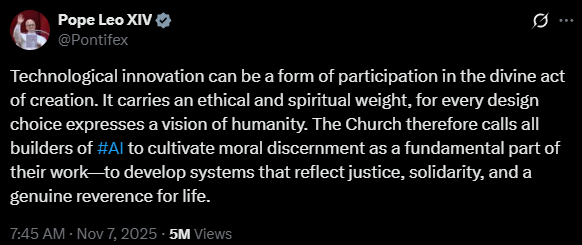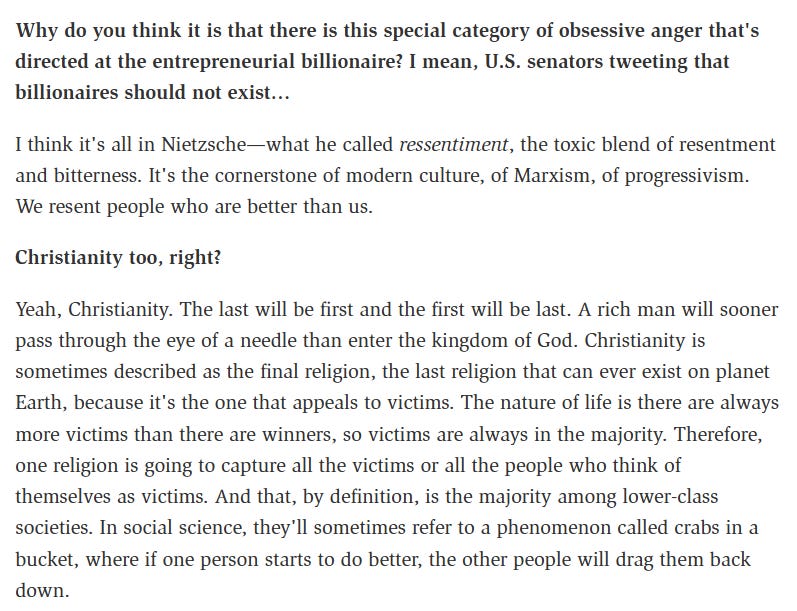Don't mock the Pope
Also: Europe reaches for the scissors
Welcome to Cautious Optimism, a newsletter on tech, business and power.
Monday. We could focus on our domestic disgrace, but why do that when we could start the week with a bit of sunshine? The stock market is up today on hopes that the government shutdown is heading to a resolution. Perhaps rising pressure from our buckling national air transit infrastructure is the final straw for Federal intransigence. An open government, a rate cut expected in December, and a reasonable run of Q3 earnings? What more could we ask for?
A lot, actually, but let’s count those blessings. To work! — Alex
📈 Trending Up: Manufacturing deflation in China … data center savings? … military purges … queer rights in China … keeping it in the family … gay marriage … humanoid robots … AI impacts …
📉 Trending Down: The domestic pasta supply … TSMC’s growth rate … interchange rates … home ownership … the population of Taiwan …
Things That Matter
Europe reaches for the scissors: The EU is gearing up to cut red tape, including a swing of the axe against GDPR, to create a more attractive environment for technology, especially AI. At issue is its lackluster economic growth, along with the broadly held view that the EU is more bent on regulating than innovating.
Many European tech leaders have called to simplify rules for startups across the Union, and for less regulation, period. They are winning the day, not only because the EU really does need more economic mobility, but because depending on US technology is increasingly unpalatable in a world where economic globalism is fading. You want to build your own stuff.
If the EU’s new, slimmed rules come to pass as expected, this is good news. Europe actually does create lots of interesting companies. Legora and DeepJudge (more here and here) are making waves in the legaltech AI space; Lovable, Klarna, and Spotify were founded in Sweden; and Mistral is keeping Europe in the foundation model game. Still, they often wind up moving, hiring and listing abroad. That’s a hybrid brain and capital drain, so something needs to change.
Perhaps Europe will find a way to have more privacy and individually-focused regulation than we can stomach here in the States, and build world-leading companies at the same time. Time will tell.
SPACs ICOs are back: Coinbase is preparing to host a token sale each month on a new platform (more from the WSJ here). Selling tokens before they are generally available was once called an initial coin offering, or ICO. For a moment, back in the 2017-2018 era, it was child’s play to raise a truckload of money through ICOs, and reward fiat backers with digital tokens and promises of future technology breakthroughs.
Mostly, however, ICOs went nowhere and people lost money, even if some like Filecoin are still around. Coinbase’s entry into the token listing game is a reminder of how much crypto-facing regulation has changed in the last year. I suppose it’s not totally that in the era of prediction markets bleeding into equities reporting, we would get ICOs once again.
Here’s hoping the Coinbase team doesn’t help float garbage. Let’s see if history can avoid rhyming.
Nothing makes me more worried about a bubble than the return of SPACs and ICOs. No OpenAI compute commitment can make me fret more than financial engineering.
I guess we’re doing socialism now: We’ve discussed state capitalism (via the government taking direct stakes in American companies) here at CO several times. But the weirdness emanating from D.C. has other flavors worth sampling:
Hammering pharma: Long a lefty bugaboo, the United States pays more for drugs than other nations despite the Federal government subsidizing pharma companies. Sen. Bernie Sanders argued for drug price discounts back in 2023. This year, POTUS got AstraZeneca to give American governments most-favored-nation pricing, and cut deals with Eli Lilly and Novo Nordisk to “dramatically reduce the prices Americans pay for some of the world’s most popular drugs.”
Investigating profitable companies: Unhappy with the price of beef — more here — POTUS has called for the Department of Justice to look into the meat packing industry, claiming the companies in question “are driving up the cost of Beef through Illicit Collusion, Price Fixing, and Price Manipulation.” Therefore, action must be taken to “ensure these Corporations are not criminally profiting at the expense of the American People.” Again, you could see Bernie saying that, yeah?
Agitating against the insurance industry: Lots of folks on the political left view insurance companies as evil giants, hoovering up profits while disbursing paltry care (the nation’s largest health insurer by market share, UnitedHealth Group, had net margins of 2.1% in its most recent quarter). POTUS thinks that the ACA is funneling money to insurance companies that, he says, are making a “KILLING,” and wants to undercut those companies using HSAs. (POTUS posted twice about health insurance companies’ profitability and worth.) Again, echoes of Bernie!
Direct cash transfers: POTUS wants to send a “dividend of at least $2000 a person (not including high income people!) [to] everyone” in the United States.
To sum: It’s now conservative to find corporate profitability gauche, to acknowledge the American healthcare system is broken, and to favor sending cash directly to citizens at the expense of the national deficit. Mix in securing some of the economy’s commanding heights and, well, I really don’t get why people are so worried about grocery stores in NYC.
The tech-Christianity merger will be messy
A16z co-founder Marc Andreessen found himself in the public opinion penalty box over the weekend after he mocked the Pope. The Pontiff had tweeted that building new products and services is not merely a material pursuit, but can instead be part of a holy life:
That was worthy of Andreessen’s displeasure, as he has argued that any attempt to slow down technology progress in the realm of AI is tantamount to murder. You can’t hybridize the two views; they are antithetical. So, the venture investor fired a broadside against Pope.
“Our present society,” Andreessen wrote in the same essay, has “been subjected to a mass demoralization campaign for six decades – against technology and against life – under varying names like […] ‘social responsibility’ […] ‘trust and safety’, [and] ‘tech ethics’.”
Reaction amongst Catholics in tech was sufficient for Marc to delete the tweets; the Pope’s notes remain online.
Notably, despite supporting New Founding (or contemporary coverage here), a conservative Christian venture effort, Andreessen is not a big fan of Christianity. Here’s the investor in a 2023 interview with Reason:
Andreessen is loosely quoting Matthew 19:16-28 here, if you were curious.
As a confirmed Lutheran — and now an antitheist — I have a little standing on the topic of Christianity and its criticisms. Marc is both wrong and right. He’s wrong that the Pope’s views are worthy of mockery. He’s right that Christianity — per the interview excerpt — is a religion of the weak, the stateless, the downtrodden. He’s also entirely correct in hinting that the teachings of Jesus are often in opposition to modern capitalism.
So why would Andreessen support Christian efforts to reshape the nation while arguing that the Pope is, I believe, woke? You can’t control the Pope, but you can control American Christianity with money, so there’s that. But I think, more accurately, there’s a strain of Christianity in America that has been entirely co-opted by business interests — viz the communism+atheism versus capitalism+Christianity splitscreen brought on by the Cold War — to the point that it is a de facto new religion. A nationalistic scream that elevates the wealthy and defends their interests while defaming the poor and the lesser.
That’s a perfectly acceptable perspective to have. It’s not, however, very Christian.
Andreessen’s chief foil in the Pope mess, @Growing_Daniel, said later that “Marc primarily funds gambling apps, cheating apps, and bot farms. He does not want you to build things that are actually good for society.”
I have long wondered how the tech right — busy cozying up to faith as a sort of anti-woke vibe check — would approach the question of Christianity’s views on the poor, on providing for those without, and the moral need to care for the weak and sick1. You can’t be an aggro-capitalist and act like a Christian; you cannot selfishmaxx while following a faith that demands you care for those with less. It just doesn’t work.
There is a way to build technology companies and comport with Christian teachings. Many ways, frankly. But hot-gluing anti-woke reactionary capitalism to Jesus’ teachings won’t prove a weld that can hold. One side of the equation will need to bend, and given that only one is powered by profit, I think I know which will win.
Matthew 25:34-36, Luke 14:12-14, Luke 6:20-21, Luke 10:25-37, etc.



